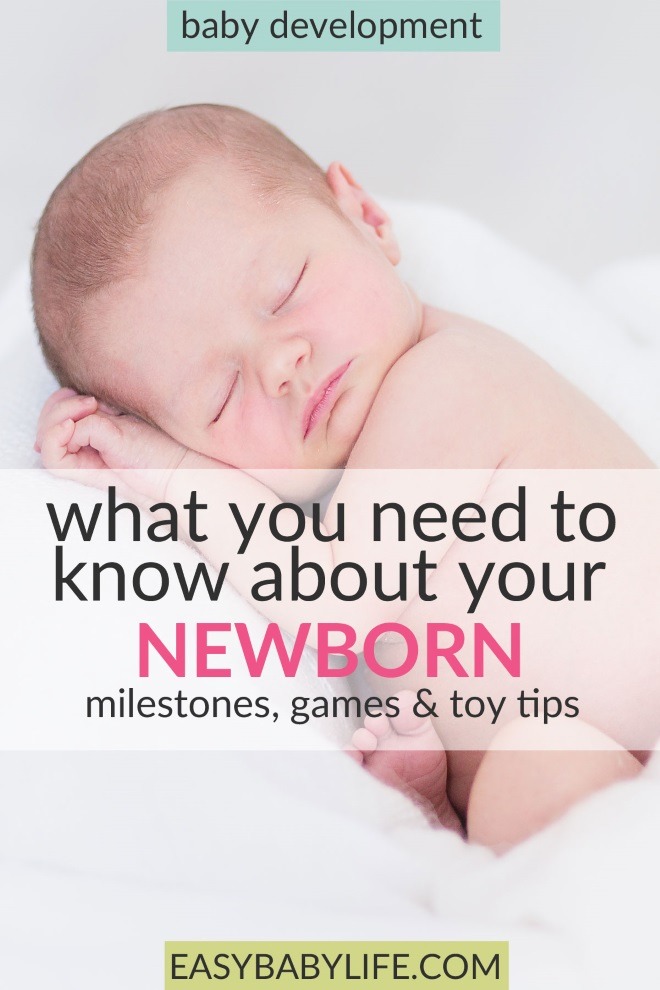If you wonder about newborn baby development milestones, we’ve got you covered here! You’ll also learn how to play with your newborn, and find tips on a few toys that even a newborn baby can enjoy.

What a tremendous moment it is, the first time you lay eyes on your newborn baby! The first time I was going to give birth, I wondered if the baby would look like a complete stranger. But every time I have given birth, my baby has looked familiar in some way right from the start.
Maybe that’s because they are said to resemble their dads initially, as it helps dads feel confident that the baby is theirs… At least that is what the old wives’ tale will tell you.
Newborn babies are so tiny and helpless. And they sleep and sleep and sleep. And eat. And poop. If breastfeeding, your little darling might actually poop every time he or she eats. (Some 8 times or more per day…) And you wondered how a new mom can be so busy… ;-)
But they are also full of abilities that will help them survive. Do you know which ones?
What to Expect for Your Newborn Baby
In this article…
Newborn Baby Development Milestones
Did you know that not too long ago it was common to do surgery on newborn babies without anesthesia? The assumption was that they wouldn’t feel the pain anyway.
Today we know better!
Physical development
Length and weight
 Every baby is different. There aren’t strict rules telling us how long a newborn should be or what is the perfect weight for a newborn.
Every baby is different. There aren’t strict rules telling us how long a newborn should be or what is the perfect weight for a newborn.
However, some guidelines tell us about the average length and weight.
When it comes to length, the average length for a newborn baby girl is 19.25 inches (49.1cm). For a newborn baby boy, the average length is 19.75 inches (49.9cm).
The average weight for a newborn baby girl is 7.5 pounds (3.4kg), while the average weight for a newborn baby boy is 7.8 pounds (3.5kg).
In the first days after delivery, babies usually lose some weight because they eliminate the extra fluid they are born with. But don’t worry, they will gain it back fast.
Keep in mind that these are only average measures and that healthy babies come in all shapes and sizes.
If you think your baby looks weird in any way, read here about normal newborn appearance.
-
Newborn Baby Skin
Your newborn’s skin can be dry and peel, red, wrinkled. It might also still be covered in soft hair called lanugo. All of this is common and doesn’t mean that something is wrong.
Your newborn baby’s skin color is also not at its final color. You can read about skin color development here.
Your infant has sensitive skin. It is not recommended to bathe your newborn daily. Even later, your baby usually doesn’t need to be washed more than 2-3 times a week. When you bathe your baby too often, it might cause dry skin.
-
Newborn acne
A fairly common newborn skin condition is newborn acne. It is believed that the cause of newborn acne is the mother’s hormones that are still circulating in the baby’s bloodstream. However, newborn acne is temporary, and you should just patiently wait for them to disappear. Learn more about baby acne here.
-
Jaundice
Another skin condition that might cause parents’ worries is newborn jaundice. Infant jaundice is a yellow discoloration of a newborn baby’s skin and eyes. It is a common condition that happens when newborn babies have a high level of bilirubin.
In most cases, newborn jaundice goes away on its own or with mild treatment. When the level of bilirubin is unusually high, it can cause brain damage in babies. However, these cases are rare.
You can read a Q&A about a newborn baby with jaundice here.
-
Vision
Your baby’s vision is not so good. However, right from the start, your baby is able to focus and follow a moving object. It can’t be too far away, though. From week 2 after birth, his immature eyes can only focus on objects that are about 8 to 10 inches from the face.
Don’t worry if your baby is cross-eyed in the beginning. The eye muscles are weak and uncoordinated and will remain so to some degree until the baby is 3 months old.
A newborn baby sees black and white patterns and strong contrasting colors the best. It is believed that the distinction between other colors is not very good until at least 3 months of age.
-
Eye color
One of the things most parents are excited to know about is their baby’s eye color.
As you probably already know, the eye color changes as the baby gets older. The change slows down after approximately 6 months of age, but it can continue for quite a long time, even until your baby is 3 years old.
These changes are related to the pigment called melanin and how much of it is secreted. Melanin also influences the hair and skin color. The more melanin is produced, the darker the eye color will be.
-
Newborn Hearing
Babies have a well-developed hearing already while still in the womb. Therefore, they often recognize their mother’s voice right from birth. A few weeks later, your baby will also recognize the voice of his dad and siblings.
-
Taste and smell
A newborn’s senses of taste and smell are also well developed. Your baby prefers sweet flavors and can turn away from something that smells bad.
Motor skills
-
Head control
Be careful always to hold your newborn’s head. The neck muscles still aren’t strong enough for your baby to control his head on her own.
Practice tummy-time with your baby every day. Place your baby on his tummy briefly a few times throughout the day to practice lifting the head.
-
Reflexes
Your newborn’s movements are random. Most of the time, they are the result of newborn reflexes.
Newborn reflexes are involuntarily movements or actions. Those primitive reflexes exist to improve newborn’s chances of survival and protection.
There are a few reflexes that a baby is born with. However, most newborn reflexes go away within the first few months.
Cognitive and social development
-
Crying
It is normal for a baby to cry. Crying is your newborn’s way of telling you what she needs. Your baby will cry when she is hungry, tired, overstimulated, in pain, etc.
Although baby’s crying can be hard to listen to and might even frustrate or overwhelm you sometimes, remember that it will get easier. With time, you will become better at recognizing why your baby is crying. Also, babies mostly cry less as they get older.
It is essential to answer your baby’s cries. If your newborn gets comforted when crying, he will know that you are near and can answer his needs, which will make him feel safe and secure.
If your newborn is crying intensely for long periods and can’t be comforted, it might be a sign of colic.
-
Skin contact
Your infant enjoys and needs skin contact. That is why it is often recommended that the mothers who can’t breastfeed their baby take their top off as often as possible when bottle-feeding the infant.
-
Preference for human faces
Already during their first weeks, babies prefer human faces to objects.
Experts explain this by a portion of the brain being dedicated to this facial recognition.
With this part of the brain being relatively well-developed right from the start, the bonding process between the baby and the mother is strengthened.
You’ll notice that your baby enjoys eye contact right from the beginning (the few moments she is alert).
-
Use of all senses
A newborn can also co-ordinate his senses. For example, your baby can watch his dad stick his tongue out and mimic it.
If you decide to try this, give your baby some time, the imitation will come after a while!
Smiling
Some babies fire off their first smile within days, while others wait a few weeks.Keep your camera ready
How To Play With Your Newborn Baby
Even if your newborn baby sleeps a lot, and can’t do very much yet, there are still things you can do to both bond and stimulate the newborn baby development.
Talk to your baby! As he is likely to recognize your voice right from the start, this will make your child feel safe. Encourage dad and siblings to do the same, to speed up the baby’s recognition of their voices.
Hearing your voice and looking into your eyes from a short distance is great fun for a new baby. Before you know it, she will start smiling at you and maybe even begin cooing. Wonderful!
You can also help your baby’s vision development by slowly moving your index finger to the right and left in front of his eyes. Make up a little rhyme while doing it. If you can, try to use the same rhyme every time you play the game, babies love routines!
Practice tummy time. For a few brief periods during the day, put your baby on her stomach to practice lifting her head. That way, she strengthens her neck and upper body muscles and improves her head control.
You can also practice tummy time by putting your baby on your chest to look at each other’s eyes once your baby lifts her head. Not only are you practicing tummy time with this activity, but you are also bonding.
Here are more ideas on how to play with a newborn baby.
Toy Tips for Newborn Babies
Your new family member doesn’t really need any toys. He needs you! Being close to mom and dad is a favorite occupation.
For some stimulation, you could invest in a baby musical mobile to hang over your baby’s crib or changing table. It has to have bright colors and patterns to be interesting.
A mobile over the crib can be used to entertain your baby up until he is old enough to be able to pull himself up to reach it Then it has to go for security reasons.
A brightly colored finger doll (or black and white) can be a fun variation when playing to train the baby’s eyes muscles as described above.
Newborn Baby Development Video
Here is a video showing a number of newborn babies and their abilities. For example, you can see the typical newborn movements and reflexes in this video.
Read Next about the Newborn Baby
- Newborn baby appearance – not as cute as in the commercials…
- The essential stuff you need for a newborn – and not
- Newborn baby activity tips
- All posts about newborn babies
Where would you like to go next?
All ABout Baby Development | 1-month-old baby
So, did you recognize this newborn baby development in your own infant? I’d love to hear about your experiences? :-)

Paula Dennholt founded Easy Baby Life in 2006 and has been a passionate parenting and pregnancy writer since then. Her parenting approach and writing are based on studies in cognitive-behavioral models and therapy for children and her experience as a mother and stepmother. Life as a parent has convinced her of how crucial it is to put relationships before rules. She strongly believes in positive parenting and a science-based approach.
Paula cooperates with a team of pediatricians who assist in reviewing and writing articles.





